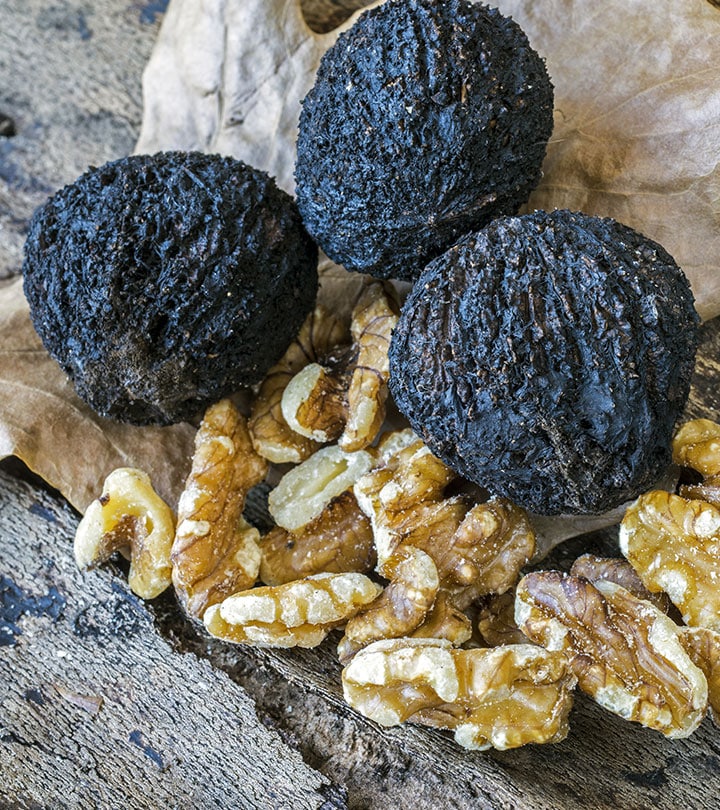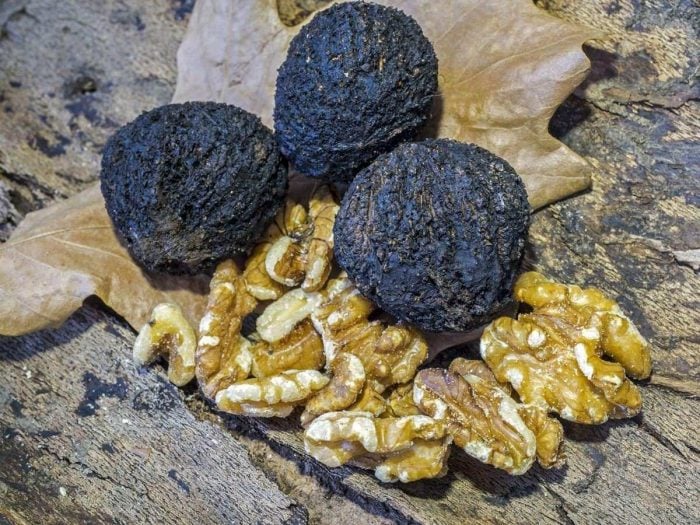Blog
Black Walnuts Health Benefits?

Black Walnuts
Black Walnuts are harvested from a medium sized tree. They are ripe when the outer covering has turned from green to brown. When properly dried and stored, they will keep indefinitely without spoiling.
Black Walnuts are the largest and sweetest of all walnuts. They are usually found in woodland areas, with black walnuts generally coming from larger trees than the English variety. They contain a high level of antioxidants and have a pleasant, unique flavor.
Nutty, buttery and delicious, black walnuts have a rich flavor that pairs perfectly with poultry and pork dishes.
Black Walnuts are said to have a very intense flavor, similar to that of the English walnut. It has a rich and appealing taste, with a bit of an acidic note associated with it.
The meats of this nut are very tasty and can be eaten raw or prepared into sauces or spreads. It is important to keep in mind that because they are so hard you will need a hammer to crack them open. Black Walnuts come from North America
Black walnuts contain both omega-3 and omega-6 fatty acids, which help reduce inflammation, and are known as powerful antioxidants. Furthermore, black walnuts’ high protein content aids in weight loss by suppressing appetite and promoting a healthy metabolism. While black walnuts have a long history of use in the herbal medicine family, they can also be enjoyed in traditional ways.
Black walnut trees grow throughout the mid-Atlantic region, but they’re especially abundant in Pennsylvania where over half of the country’s black walnuts are grown. These trees can live up to 200 years and grow as tall as 50 feet with a diameter of 18 inches.
When it comes to wholesome nutrition, few foods pack a punch quite like black walnuts. Nestled inside their tough shells lies a treasure trove of health benefits that have been cherished for centuries. In this exploration, we unveil the remarkable advantages that black walnuts offer, making them a valuable addition to your diet.
1. A Nutritional Powerhouse: Black walnuts are rich in essential nutrients. Packed with omega-3 fatty acids, antioxidants, vitamins, and minerals, they provide a diverse array of elements vital for overall health. From magnesium to folate, black walnuts offer a nutritional spectrum that supports various bodily functions.
2. Heart Health: Consuming black walnuts can be a heart-healthy choice. Their omega-3 fatty acids can help lower bad cholesterol levels, reducing the risk of heart disease. Additionally, they contain arginine, an amino acid that supports healthy blood vessels, promoting cardiovascular well-being.
3. Brain Boosting Abilities: The omega-3 fatty acids in black walnuts aren’t just good for the heart; they’re great for the brain too. These healthy fats support cognitive function, potentially reducing the risk of cognitive decline as you age. Regular consumption can boost memory and mental clarity.
4. Immune System Support: Black walnuts are packed with antioxidants, including vitamin E and quinone compounds, which help neutralize harmful free radicals. A bolstered immune system means your body is better equipped to fight off infections and diseases.
5. Anti-Inflammatory Properties: Chronic inflammation is linked to various health issues, including arthritis and cardiovascular diseases. Black walnuts contain anti-inflammatory compounds that can help reduce inflammation, providing relief from joint pain and discomfort.
6. Digestive Health: High in fiber, black walnuts aid in digestion and promote a healthy gut. Fiber adds bulk to the stool, preventing constipation and supporting regular bowel movements. A healthy digestive system is fundamental to overall well-being.
7. Skin and Hair Benefits: The vitamins and minerals in black walnuts contribute to healthy skin and hair. Vitamin E, in particular, promotes skin elasticity and protects against free radical damage. Additionally, the biotin content supports hair strength and growth.
8. Weight Management: The combination of protein and fiber in black walnuts can promote a feeling of fullness, helping control appetite and support weight management goals. Including them in your diet can be a satisfying and nutritious snack option.
9. Potential Cancer Prevention: Some studies suggest that compounds found in black walnuts may have anti-cancer properties. While more research is needed, these findings are promising and indicate the potential of black walnuts in cancer prevention.
10. Cooking and Culinary Delights: Beyond their health benefits, black walnuts add a delightful, earthy flavor to various dishes. From salads and pestos to baked goods and desserts, their unique taste elevates culinary creations, making healthy eating a flavorful experience.
Incorporating black walnuts into your diet is an investment in your well-being. Whether sprinkled on a salad, blended into a smoothie, or simply enjoyed on their own, these small but mighty nuts offer a wealth of health benefits. So, why not embrace the goodness of black walnuts and embark on a journey to a healthier, happier you?
Table of Content
-
Black Walnuts are rich in essential fatty acids
-
Natural occurring antioxidants
-
Good source of dietary fiber
-
Black Walnuts are nutritious and delicious
Black Walnuts are rich in essential fatty acids
Black walnuts are rich in essential fatty acids. They are also a good source of iron, potassium and magnesium.
Black Walnuts are rich in essential fatty acids, which help provide the necessary nutrients and support to maintain healthy skin, eyes, and hair.
Black Walnuts are rich in essential fatty acids and the highest concentrations of omega 3 fats in any tree nut. Black walnuts are a good source of copper and manganese, two minerals that support an overall healthy body.
Black Walnuts are famous for their rich, creamy and nutty taste. They can be eaten whole or chopped and used as a topping for salads, a garnish to main dishes, or as an ingredient in cookies, cakes and desserts. Black Walnuts also contain essential fatty acids which help maintain healthy skin, hair and nails.
Black Walnuts are rich in essential fatty acids like linoleic acid, oleic acid and linolenic acid. These potent Omega-3s fight inflammation, making Black Walnuts a natural remedy for skin conditions like eczema and psoriasis.
Black Walnuts are notable for their high content of omega-6 fatty acids, needed for healthy skin. They contain more than other fruits, including peaches and olive oil. Black Walnut also has valuable levels of vitamins A, C, E and K.
Natural occurring antioxidants
Full of vitamins, minerals, fiber and antioxidants.
These walnuts are naturally occurring antioxidants that help to support heart health and prevent cellular damage.
Black Walnuts are natural occurring antioxidants and contain more antioxidants than any other nut or fruit.
Black Walnuts provide a rich source of powerful antioxidants with high antioxidant capacity per serving.
Black walnuts are naturally rich in antioxidants and are excellent sources of many nutrients like vitamin C, magnesium and selenium.
Black Walnut Hull Powder is a natural occurring antioxidant. It aids in the building of immune system function, blood cleansing and removal of harmful free radicals.
Good source of dietary fiber
Black walnuts are good source of dietary fiber, an essential nutrient that promotes healthy digestion.
Black walnuts are known for their high levels of omega 3 fatty acids. These tasty nuts are an excellent source of dietary fiber, magnesium and manganese.
Black walnuts are the best local superfood with a high content of dietary fiber, unsaturated fatty acids, minerals and vitamins.
If you’re looking for a tasty, healthy snack you’ll love these black walnuts. Black walnuts are a great source of dietary fiber and protein which makes these nuts a healthy treat to include in your diet.
Black walnuts are a good source of dietary fiber and omega-3 fatty acids. They also contain antioxidants like polyphenols, making them especially good for your cardiovascular system and brain health
Black Walnuts are the perfect snack for a healthy lifestyle. They are high in protein, fiber and omega-3 fatty acids, which make them much better for your heart than any other nut. This delicious variety of walnut really is the star of any dish or recipe.
Black Walnuts are nutritious and delicious
Black Walnut trees produce delicious, nutritious nuts.
One of the most nutritious and delicious nuts around, Black Walnuts are a favorite of many. Use them in baking, salads and desserts, or just snack on them while they’re still warm out of the oven!
Black walnuts are very nutritious and delicious. The black walnut is one of the most versatile and useful trees, with over 100 uses. The nuts are ready to harvest in the late fall as they turn black. Traditionally, they were used to flavor dishes and beverages such as baked goods and drinks, but they also can be added to salads or ground up into pesto-like sauces.
Black Walnuts are rich in essential fatty acids and contain more antioxidants than blueberries. They’re also higher in protein and lower in sugar than their green relatives, making them a better snack food for dieters.
Give your favorite recipes a boost with the sweet, nutty flavor of Black Walnuts. With less calories than traditional walnuts, these hard-shelled nuts can be used in any recipe that calls for walnuts.
Black Walnuts are an incredibly nutritious and flavorful nut. Almost all of the oil and fat in a black walnut is located in it’s thickly husked shell, making it difficult to eat by hand. So here at Black Walnuts, we’ve made that easy for you!
Here are 10 frequently asked questions on the topic Black walnuts health benefits?
Q1: Can black walnuts be consumed by individuals with nut allergies? A1: Individuals with nut allergies should exercise caution. While not true nuts, black walnuts can still cause allergic reactions in some individuals. It’s advisable to consult a healthcare professional before consuming them.
Q2: Are black walnuts a good source of protein? A2: Yes, black walnuts are a decent source of plant-based protein. They can be a part of a vegetarian or vegan diet to fulfill protein requirements.
Q3: Can black walnuts be beneficial for hair growth? A3: The nutrients in black walnuts, especially biotin and vitamin E, contribute to hair health. While they won’t miraculously promote hair growth, including them in a balanced diet can support overall hair health.
Q4: Can black walnuts help in reducing joint pain? A4: The anti-inflammatory properties of black walnuts might help alleviate joint pain associated with conditions like arthritis. However, it’s essential to consult a healthcare provider for proper management.
Q5: What is the best way to store black walnuts for freshness? A5: Store black walnuts in an airtight container in the refrigerator or freezer to maintain their freshness. Due to their high oil content, they can go rancid if stored at room temperature for extended periods.
Q6: Can black walnuts help in reducing symptoms of allergies? A6: Some studies suggest that the anti-inflammatory properties in black walnuts might help alleviate allergy symptoms. However, individual responses vary, and consulting an allergist is essential.
Q7: Are there any side effects associated with excessive black walnut consumption? A7: Excessive consumption of black walnuts can lead to digestive issues due to their high fiber content. It’s crucial to consume them in moderation to avoid discomfort.
Q8: Can black walnuts aid in weight management? A8: The fiber and protein content in black walnuts can promote satiety, aiding in weight management when consumed as part of a balanced diet. However, portion control is key.
Q9: Are there any cultural or historical beliefs associated with black walnuts? A9: Black walnuts have historical significance in Native American cultures, where they were used for medicinal purposes. They are also used in various traditional recipes in different cuisines.
Q10: Can pregnant women and nursing mothers safely consume black walnuts? A10: Pregnant women and nursing mothers should consult healthcare providers before introducing black walnuts into their diets. While they offer nutrients, individual health circumstances must be considered.




One thought on “Black Walnuts Health Benefits?”